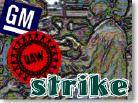|
GM strike talks stall
|
 |
July 13, 1998: 9:50 a.m. ET
As two-week shutdown ends, losses mount again at crippled automaker
|
NEW YORK (CNNfn) - Losses at General Motors continued their upward spiral Monday after face-to-face talks between management and union members to end two month-long strikes broke down over the weekend, dashing hopes for a settlement before the end of a two-week summer-vacation shutdown.
Lower-level talks are expected to continue Monday in Flint, Mich., and top negotiators have said they would return to the bargaining table in the event of a breakthrough.
A resolution would have sent 9,200 striking workers from two key parts plants back to the assembly line.
The month-long walkouts, which erupted June 5 at a Flint metal-stamping plant and quickly spread to the neighboring Delphi diversified parts facility, have crippled production at 26 of GM's 29 North American assembly plants, and idled more than 160,000 non-striking hourly workers.
The strikes have reduced GM's second-quarter earnings by $1.18 billion. The failure to settle this weekend means the company will continue generating about $75 million a day in losses beginning Monday.
Going into the weekend, analysts and Wall Street had conjectured that GM and the United Auto Workers would pull out all stops to settle the work stoppages before the end of the shutdown. UAW leaders retorted, however, that the resumption of work was "an artificial deadline." One union spokesman insisted he would be "shocked" if the negotiators settled over the weekend.
Over the weekend, those quips turned into prophecies as both sides hunkered down behind the bargaining table, but refused to budge.
GM says UAW is being intransigent
Gerald Knechtel, the GM vice president in charge of labor negotiations, returned to Detroit from Flint, where the talks were being held, saying he would come back quickly if conditions changed. Late last week, Knechtel told reporters he believed a settlement was possible. Sunday, he blamed what he saw as union intransigence on the impasse.
GM also vowed Sunday to intensify cost-cutting efforts at the company. In the past, GM has threatened to bring in outside suppliers to allow the reopening of as many as 10 assembly plants. But many analysts have dismissed that tactic as a red herring aimed at wresting negotiating leverage from the UAW.
GM is also said to be pursuing a grievance filed in June to compel the strikers to return to work. In the grievance, GM accused the workers of violating a national agreement that limits the issues over which workers may strike.
The disputes at both plants, while varying in their details, involve fundamentally the same issue - primarily, GM's avowed desire to farm out more of its parts manufacturing, just as Ford Motor Co. and Chrysler Corp. have done, to remain competitive.
The shrinking UAW, by contrast, is trying to keep GM from eliminating more of its members' jobs by transferring, or "outsourcing," work to non-union suppliers.
UAW 659, which represents 3,400 workers at the Flint Metal Center, accuse GM of reneging on a pledge to invest $300 million in a plant upgrade that would ensure the future viability of the facility. GM counters that the workers' lack of flexibility over work rule has caused the plant to lose as much as $50 million a year and has prevented new equipment from being used to maximum efficiency.
At the Delphi parts facility, which makes such integral components as dashboards, spark plugs and speedometers, the 5,800 striking workers fear the loss of their jobs through wholesale transfers and "outsourcing" to presumably cheaper suppliers.
At this point, GM insists that any settlement must include deals to prevent threatened strikes at a stamping plant in Indianapolis, a brake facility in Dayton, Ohio, and an engine and powertrain components operation in Flint.
In Indianapolis, GM workers voted Sunday to authorize a strike. Workers at the other two plants already have done so.
After losing $2.87 billion in strikes over the past three years -- including $900 million from a 17-day strike in 1996 at two Dayton brake plants -- GM sees the promise of labor peace as the only face-saving solution, analysts say.
GM's car production already is down 285,000, and the nation's largest automaker can't begin making its 1999 cars, trucks and other models until the assembly lines roll again. UAW officials have pegged weekly GM losses at $400 million.
Among the austerity measures GM apparently is considering are options to suspend health care coverage for more than 160,000 non-striking workers, or to eliminate models that have performed poorly on the market.
Meanwhile, GM has vowed to do whatever is necessary to launch a new full-size pickup at its Oshawa, Ontario, plant.
Shares of GM (GM) were down 1 -9/16 to 69 -5/8 early Monday on the New York Stock Exchange.
|
|
|
|
|
 |

|

